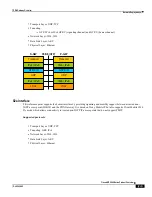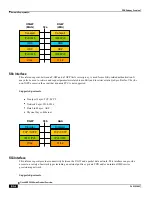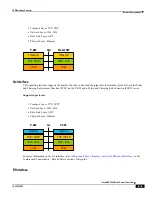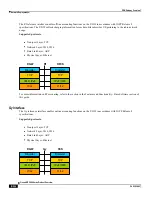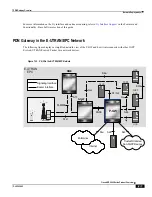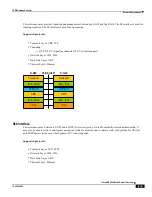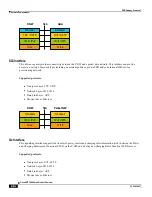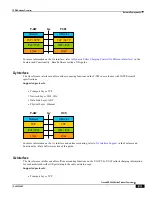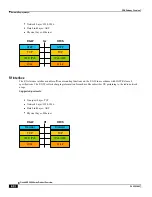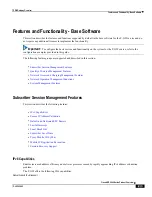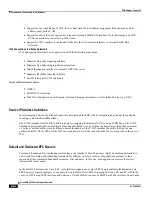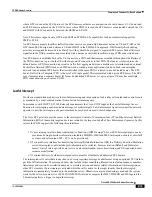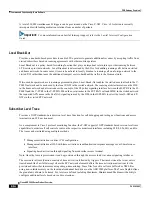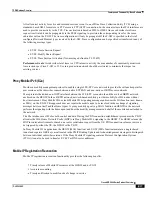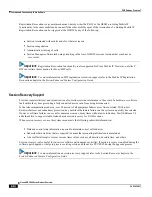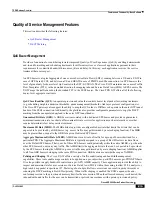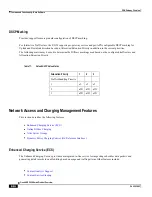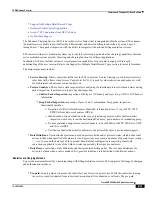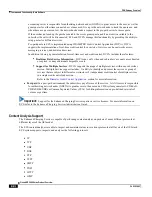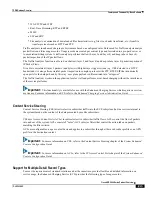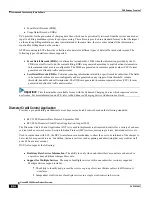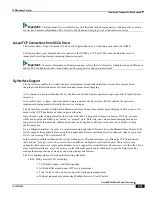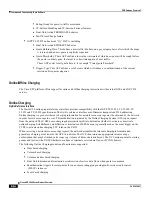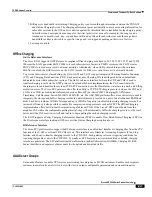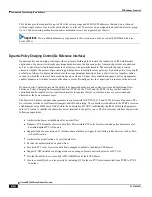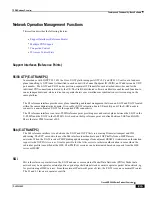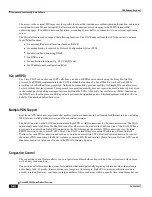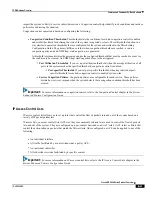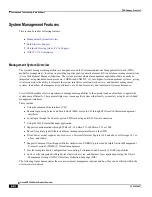
PDN Gateway Overview
Features and Functionality - Base Software ▀
Cisco ASR 5000 Series Product Overview ▄
OL-22938-02
All call control activity for active and recorded sessions is sent to an off-line Trace Collection Entity (TCE) using a
standards-based XML format over a FTP or secure FTP (SFTP) connection. In the current release the IPv4 interfaces are
used to provide connectivity to the TCE. Trace activation is based on IMSI or IMEI. Once a subscriber level trace
request is activated it can be propagated via the S5/S8 signaling to provision the corresponding trace for the same
subscriber call on the P-GW. The trace configuration will only be propagated if the P-GW is specified in the list of
configured Network Element types received by the S-GW. Trace configuration can be specified or transferred in any of
the following message types:
S5/S8: Create Session Request
S5/S8: Modify Bearer Request
S5/S8: Trace Session Activation (New message defined in TS 32.422)
Performance Goals
: As subscriber level trace is a CPU intensive activity the max number of concurrently monitored
trace sessions per Cisco P-GW is 32. Use in a production network should be restricted to minimize the impact on
existing services.
Proxy Mobile IPv6 (S2a)
Provides a mobility management protocol to enable a single LTE-EPC core network to provide the call anchor point for
user sessions as the subscriber roams between native EUTRAN and non-native e-HRPD access networks
S2a represents the trusted non-3GPP interface between the LTE-EPC core network and the evolved HRPD network
anchored on the HSGW. In the e-HRPD network, network-based mobility provides mobility for IPv6 nodes without
host involvement. Proxy Mobile IPv6 extends Mobile IPv6 signaling messages and reuses the HA function (now known
as LMA) on the P-GW. This approach does not require the mobile node to be involved in the exchange of signaling
messages between itself and the Home Agent. A proxy mobility agent (e.g. MAG function on HSGW) in the network
performs the signaling with the home agent and does the mobility management on behalf of the mobile node attached to
the network.
The S2a interface uses IPv6 for both control and data. During the PDN connection establishment procedures the P-GW
allocates the IPv6 Home Network Prefix (HNP) via Proxy Mobile IPv6 signaling to the HSGW. The HSGW returns the
HNP in router advertisement or based on a router solicitation request from the UE. PDN connection release events can
be triggered by either the UE, the HSGW or the P-GW.
In Proxy Mobile IPv6 applications the HSGW (MAG function) and P-GW (LMA function) maintain a single shared
tunnel and separate GRE keys are allocated in the PMIP Binding Update and Acknowledgement messages to distinguish
between individual subscriber sessions. If the Proxy Mobile IP signaling contains Protocol Configuration Options
(PCOs) it can also be used to transfer P-CSCF or DNS server addresses
Mobile IP Registration Revocation
Mobile IP registration revocation functionality provides the following benefits:
Timely release of Mobile IP resources at the HSGW and/or P-GW
Accurate accounting
Timely notification to mobile node of change in service
Summary of Contents for ASR 5000 Series
Page 1: ......
Page 26: ......
Page 48: ...New In Release 10 0 SCM Features Cisco ASR 5000 Series Product Overview OL 22938 02 ...
Page 50: ......
Page 58: ......
Page 68: ......
Page 126: ......
Page 138: ......
Page 146: ......
Page 218: ......
Page 236: ......
Page 356: ......
Page 374: ......
Page 422: ......
Page 496: ......
Page 572: ......
Page 654: ......
Page 700: ......
Page 726: ......
Page 784: ......
Page 816: ......
Page 844: ......
Page 906: ......
Page 926: ......
Page 942: ......
Page 943: ...Cisco ASR 5000 Series Product Overview OL 22938 02 Chapter 30 Technical Specifications ...
Page 966: ......
Page 972: ......

